Question
The year 2010 was a very good one for Delis Foods Corporation, a San Francisco- based food conglomerate. Its domestic sales were $24 billion
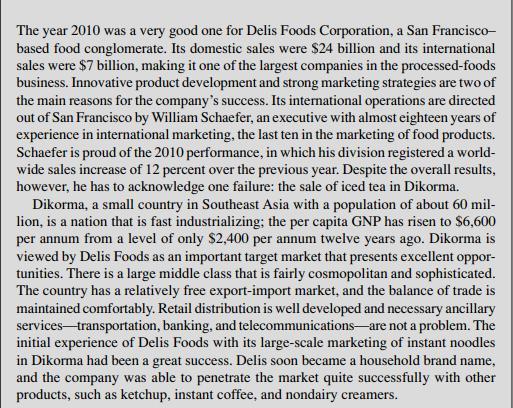
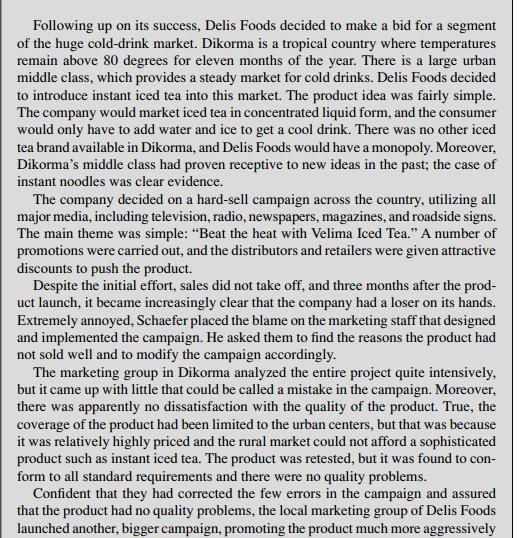
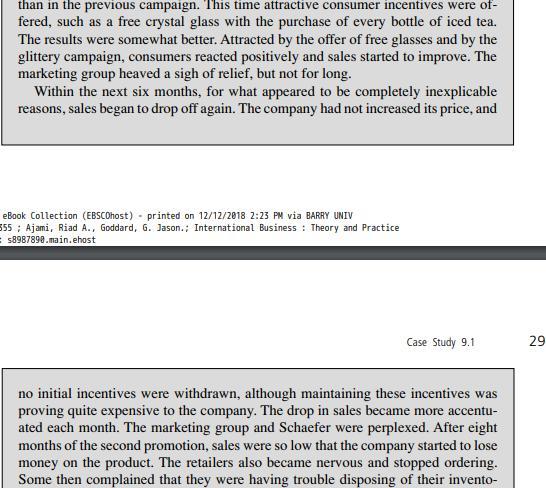
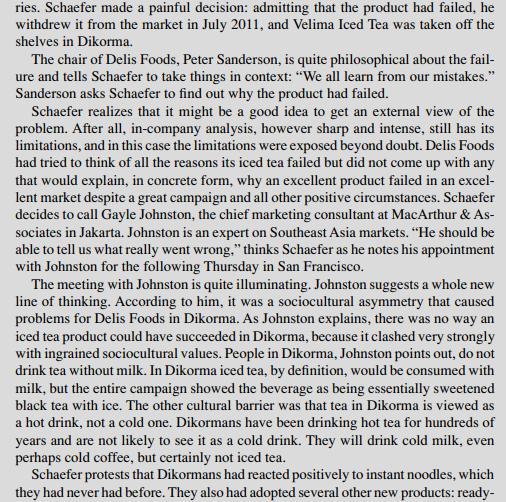
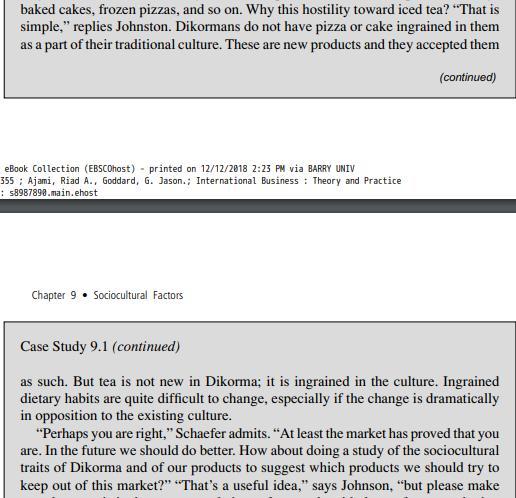
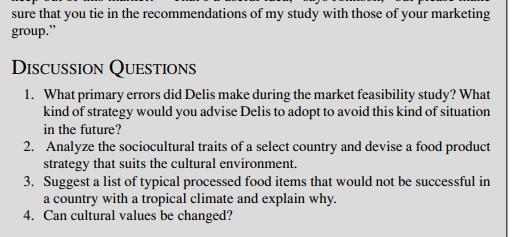
The year 2010 was a very good one for Delis Foods Corporation, a San Francisco- based food conglomerate. Its domestic sales were $24 billion and its international sales were $7 billion, making it one of the largest companies in the processed-foods business. Innovative product development and strong marketing strategies are two of the main reasons for the company's success. Its international operations are directed out of San Francisco by William Schaefer, an executive with almost eighteen years of experience in international marketing, the last ten in the marketing of food products. Schaefer is proud of the 2010 performance, in which his division registered a world- wide sales increase of 12 percent over the previous year. Despite the overall results, however, he has to acknowledge one failure: the sale of iced tea in Dikorma. Dikorma, a small country in Southeast Asia with a population of about 60 mil- lion, is a nation that is fast industrializing; the per capita GNP has risen to $6,600 per annum from a level of only $2,400 per annum twelve years ago. Dikorma is viewed by Delis Foods as an important target market that presents excellent oppor- tunities. There is a large middle class that is fairly cosmopolitan and sophisticated. The country has a relatively free export-import market, and the balance of trade is maintained comfortably. Retail distribution is well developed and necessary ancillary services transportation, banking, and telecommunications are not a problem. The initial experience of Delis Foods with its large-scale marketing of instant noodles in Dikorma had been a great success. Delis soon became a household brand name, and the company was able to penetrate the market quite successfully with other products, such as ketchup, instant coffee, and nondairy creamers. Following up on its success, Delis Foods decided to make a bid for a segment of the huge cold-drink market. Dikorma is a tropical country where temperatures remain above 80 degrees for eleven months of the year. There is a large urban middle class, which provides a steady market for cold drinks. Delis Foods decided to introduce instant iced tea into this market. The product idea was fairly simple. The company would market iced tea in concentrated liquid form, and the consumer would only have to add water and ice to get a cool drink. There was no other iced tea brand available in Dikorma, and Delis Foods would have a monopoly. Moreover, Dikorma's middle class had proven receptive to new ideas in the past; the case of instant noodles was clear evidence. The company decided on a hard-sell campaign across the country, utilizing all major media, including television, radio, newspapers, magazines, and roadside signs. The main theme was simple: "Beat the heat with Velima Iced Tea." A number of promotions were carried out, and the distributors and retailers were given attractive discounts to push the product. Despite the initial effort, sales did not take off, and three months after the prod- uct launch, it became increasingly clear that the company had a loser on its hands. Extremely annoyed, Schaefer placed the blame on the marketing staff that designed and implemented the campaign. He asked them to find the reasons the product had not sold well and to modify the campaign accordingly. The marketing group in Dikorma analyzed the entire project quite intensively, but it came up with little that could be called a mistake in the campaign. Moreover, there was apparently no dissatisfaction with the quality of the product. True, the coverage of the product had been limited to the urban centers, but that was because it was relatively highly priced and the rural market could not afford a sophisticated product such as instant iced tea. The product was retested, but it was found to con- form to all standard requirements and there were no quality problems. Confident that they had corrected the few errors in the campaign and assured that the product had no quality problems, the local marketing group of Delis Foods launched another, bigger campaign, promoting the product much more aggressively than in the previous campaign. This time attractive consumer incentives were of- fered, such as a free crystal glass with the purchase of every bottle of iced tea. The results were somewhat better. Attracted by the offer of free glasses and by the glittery campaign, consumers reacted positively and sales started to improve. The marketing group heaved a sigh of relief, but not for long. Within the next six months, for what appeared to be completely inexplicable reasons, sales began to drop off again. The company had not increased its price, and eBook Collection (EBSCOhost) printed on 12/12/2018 2:23 PM via BARRY UNIV 555; Ajami, Riad A., Goddard, 6. Jason.; International Business: Theory and Practice s8987890.main.ehost Case Study 9.1 no initial incentives were withdrawn, although maintaining these incentives was proving quite expensive to the company. The drop in sales became more accentu- ated each month. The marketing group and Schaefer were perplexed. After eight months of the second promotion, sales were so low that the company started to lose money on the product. The retailers also became nervous and stopped ordering. Some then complained that they were having trouble disposing of their invento- 29 ries. Schaefer made a painful decision: admitting that the product had failed, he withdrew it from the market in July 2011, and Velima Iced Tea was taken off the shelves in Dikorma. The chair of Delis Foods, Peter Sanderson, is quite philosophical about the fail- ure and tells Schaefer to take things in context: "We all learn from our mistakes." Sanderson asks Schaefer to find out why the product had failed. Schaefer realizes that it might be a good idea to get an external view of the problem. After all, in-company analysis, however sharp and intense, still has its limitations, and in this case the limitations were exposed beyond doubt. Delis Foods had tried to think of all the reasons its iced tea failed but did not come up with any that would explain, in concrete form, why an excellent product failed in an excel- lent market despite a great campaign and all other positive circumstances. Schaefer decides to call Gayle Johnston, the chief marketing consultant at MacArthur & As- sociates in Jakarta. Johnston is an expert on Southeast Asia markets. "He should be able to tell us what really went wrong," thinks Schaefer as he notes his appointment with Johnston for the following Thursday in San Francisco. The meeting with Johnston is quite illuminating. Johnston suggests a whole new line of thinking. According to him, it was a sociocultural asymmetry that caused problems for Delis Foods in Dikorma. As Johnston explains, there was no way an iced tea product could have succeeded in Dikorma, because it clashed very strongly with ingrained sociocultural values. People in Dikorma, Johnston points out, do not drink tea without milk. In Dikorma iced tea, by definition, would be consumed with milk, but the entire campaign showed the beverage as being essentially sweetened black tea with ice. The other cultural barrier was that tea in Dikorma is viewed as a hot drink, not a cold one. Dikormans have been drinking hot tea for hundreds of years and are not likely to see it as a cold drink. They will drink cold milk, even perhaps cold coffee, but certainly not iced tea. Schaefer protests that Dikormans had reacted positively to instant noodles, which they had never had before. They also had adopted several other new products: ready- baked cakes, frozen pizzas, and so on. Why this hostility toward iced tea? "That is simple," replies Johnston. Dikormans do not have pizza or cake ingrained in them as a part of their traditional culture. These are new products and they accepted them (continued) eBook Collection (EBSCOhost) printed on 12/12/2018 2:23 PM via BARRY UNIV 355 Ajami, Riad A., Goddard, G. Jason.; International Business: Theory and Practice : s8987898.main.ehost Chapter 9. Sociocultural Factors Case Study 9.1 (continued) as such. But tea is not new in Dikorma; it is ingrained in the culture. Ingrained dietary habits are quite difficult to change, especially if the change is dramatically in opposition to the existing culture. "Perhaps you are right," Schaefer admits. "At least the market has proved that you are. In the future we should do better. How about doing a study of the sociocultural traits of Dikorma and of our products to suggest which products we should try to keep out of this market?" "That's a useful idea," says Johnson, "but please make sure that you tie in the recommendations of my study with those of your marketing group." DISCUSSION QUESTIONS 1. What primary errors did Delis make during the market feasibility study? What kind of strategy would you advise Delis to adopt to avoid this kind of situation in the future? 2. Analyze the sociocultural traits of a select country and devise a food product strategy that suits the cultural environment. 3. Suggest a list of typical processed food items that would not be successful in a country with a tropical climate and explain why. 4. Can cultural values be changed?
Step by Step Solution
3.29 Rating (120 Votes )
There are 3 Steps involved in it
Step: 1
Primary Errors Made During the Market Feasibility Study Delis Food Corporation enjoying its success decided to enter the colddrink market of the Dikorma Delis management decided to introduce ice tea e...
Get Instant Access with AI-Powered Solutions
See step-by-step solutions with expert insights and AI powered tools for academic success
Step: 2

Step: 3

Document Format ( 1 attachment)
6329a811c3afc_103905.docx
120 KBs Word File
Ace Your Homework with AI
Get the answers you need in no time with our AI-driven, step-by-step assistance
Get Started


